android自定义左侧滑出菜单
Gogym 人气:0这里给大家提供一个类似QQ聊天那种可以左侧滑出菜单的自定义控件。希望对大家有帮助。参考了一些网友的做法,自己整理优化了一下,用法非常简单,就一个类,不需要自己写任何的代码,只要添加上布局就能实现侧滑菜单效果,非常方便。不多说,一看就懂。
先来看看效果:

先看看实现:
package com.kokjuis.travel.customView;
import android.content.Context;
import android.content.res.TypedArray;
import android.graphics.Point;
import android.support.v4.widget.ViewDragHelper;
import android.util.AttributeSet;
import android.util.Log;
import android.view.Gravity;
import android.view.MotionEvent;
import android.view.View;
import android.view.ViewGroup;
import android.widget.FrameLayout;
import com.kokjuis.travel.R;
/**
* <com.kokjuis.travel.customView.SwipeDragLayout
android:id="@+id/swip_layout"
android:layout_width="match_parent"
android:layout_height="70dp"
android:clickable="true"
app:ios="true"
app:click_to_close="true"
>
<LinearLayout
android:id="@+id/id_back"
android:layout_width="match_parent"
android:layout_height="wrap_content"
android:gravity="right">
<Button
android:id="@+id/btn_delete"
android:layout_width="70dp"
android:layout_height="70dp"
android:background="#00ffff"
android:text="删除" />
<Button
android:id="@+id/btn_move"
android:layout_marginLeft="1dp"
android:layout_width="70dp"
android:layout_height="70dp"
android:background="#00ffff"
android:text="移动" />
</LinearLayout>
<RelativeLayout
android:id="@+id/id_front"
android:layout_width="match_parent"
android:layout_height="wrap_content"
android:background="@color/white">
.........你的布局
</RelativeLayout>
</com.kokjuis.travel.customView.SwipeDragLayout>
*
*
*
* 用法就是直接用这个控件把需要的布局包起来
* 可滑动的layout extends FrameLayout
*/
public class SwipeDragLayout extends FrameLayout {
private static SwipeDragLayout mCacheView;
private View contentView;//列表的view
private View menuView;//滑出菜单的view
private ViewDragHelper mDragHelper;
private Point originPos = new Point();
private boolean isOpen, ios, clickToClose;
private float offset;
private float needOffset = 0.2f;
private SwipeListener mListener;
public SwipeDragLayout(Context context) {
this(context, null);
}
public SwipeDragLayout(Context context, AttributeSet attrs) {
this(context, attrs, 0);
}
public SwipeDragLayout(Context context, AttributeSet attrs, int defStyleAttr) {
super(context, attrs, defStyleAttr);
TypedArray array = context.obtainStyledAttributes(attrs, R.styleable.SwipeDragLayout);
needOffset = array.getFloat(R.styleable.SwipeDragLayout_need_offset, 0.2f);
//是否有回弹效果
ios = array.getBoolean(R.styleable.SwipeDragLayout_ios, false);
clickToClose = array.getBoolean(R.styleable.SwipeDragLayout_click_to_close, false);
init();
array.recycle();
}
public static SwipeDragLayout getmCacheView() {
return mCacheView;
}
//初始化dragHelper,对拖动的view进行操作
private void init() {
mDragHelper = ViewDragHelper.create(this, 1.0f, new ViewDragHelper.Callback() {
@Override
public boolean tryCaptureView(View child, int pointerId) {
return child == contentView;
}
@Override
public void onViewReleased(View releasedChild, float xvel, float yvel) {
if (releasedChild == contentView) {
if (isOpen()) {
if (offset != 1 && offset > (1 - needOffset)) {
open();
} else if (offset == 1) {
if (clickToClose) {
close();
}
} else {
close();
}
} else {
if (offset != 0 && offset < needOffset) {
close();
} else if (offset == 0) {
getParent().requestDisallowInterceptTouchEvent(false);
} else {
open();
Log.d("Released and isOpen", "" + isOpen);
if (mListener != null) {
mListener.onOpened(SwipeDragLayout.this);
}
}
}
invalidate();
}
}
@Override
public int clampViewPositionHorizontal(View child, int left, int dx) {
//滑动距离,如果启动效果,则可滑动3/2倍菜单宽度的距离
final int leftBound = getPaddingLeft() - (ios ? menuView.getWidth() * 3 / 2 : menuView.getWidth());
final int rightBound = getWidth() - child.getWidth();
final int newLeft = Math.min(Math.max(left, leftBound), rightBound);
return newLeft;
}
@Override
public int getViewHorizontalDragRange(View child) {
return contentView == child ? menuView.getWidth() : 0;
}
@Override
public void onViewPositionChanged(View changedView, int left, int top, int dx, int dy) {
final int childWidth = menuView.getWidth();
offset = -(float) (left - getPaddingLeft()) / childWidth;
//offset can callback here
if (mListener!=null){
mListener.onUpdate(SwipeDragLayout.this,offset);
}
}
});
}
public void setClickToClose(boolean clickToClose) {
this.clickToClose = clickToClose;
}
public void setIos(boolean ios) {
this.ios = ios;
}
public boolean isOpen() {
return isOpen;
}
public void open() {
mCacheView = SwipeDragLayout.this;
mDragHelper.settleCapturedViewAt(originPos.x - menuView.getWidth(), originPos.y);
isOpen = true;
}
public void smoothOpen(boolean smooth) {
mCacheView = SwipeDragLayout.this;
if (smooth) {
mDragHelper.smoothSlideViewTo(contentView, originPos.x - menuView.getWidth(), originPos.y);
} else {
contentView.layout(originPos.x - menuView.getWidth(), originPos.y, menuView.getLeft(), menuView.getBottom());
}
}
//滑动关闭方法
private void smoothClose(boolean smooth) {
if (smooth) {
mDragHelper.smoothSlideViewTo(contentView, getPaddingLeft(), getPaddingTop());
postInvalidate();
} else {
contentView.layout(originPos.x, originPos.y, menuView.getRight(), menuView.getBottom());
}
isOpen = false;
mCacheView = null;
}
public void close() {
mDragHelper.settleCapturedViewAt(originPos.x, originPos.y);
isOpen = false;
mCacheView = null;
if (mListener != null) {
mListener.onClosed(SwipeDragLayout.this);
}
}
@Override
public boolean onInterceptTouchEvent(MotionEvent ev) {
switch (ev.getAction()) {
case MotionEvent.ACTION_DOWN:
if (mCacheView != null) {
if (mCacheView != this) {
mCacheView.smoothClose(true);
return true;//点击关闭后不执行其他click事件
}else if(isOpen()&&ev.getX()<menuView.getLeft()){
mDragHelper.smoothSlideViewTo(contentView, getPaddingLeft(), getPaddingTop());
postInvalidate();
return true;//点击关闭后不执行其他click事件
}
getParent().requestDisallowInterceptTouchEvent(true);
}
break;
}
return mDragHelper.shouldInterceptTouchEvent(ev);
}
@Override
public boolean onTouchEvent(MotionEvent event) {
mDragHelper.processTouchEvent(event);
return true;
}
@Override
protected void onLayout(boolean changed, int left, int top, int right, int bottom) {
super.onLayout(changed, left, top, right, bottom);
originPos.x = contentView.getLeft();
originPos.y = contentView.getTop();
}
@Override
public void computeScroll() {
if (mDragHelper.continueSettling(true)) {
invalidate();
}
}
@Override
protected void onFinishInflate() {
super.onFinishInflate();
contentView = getChildAt(1);
menuView = getChildAt(0);
FrameLayout.LayoutParams params = new LayoutParams(ViewGroup.LayoutParams.WRAP_CONTENT, ViewGroup.LayoutParams.WRAP_CONTENT);
params.gravity = Gravity.RIGHT;
menuView.setLayoutParams(params);
//重写OnClickListener会导致关闭失效
if (contentView!=null){
contentView.setOnClickListener(new OnClickListener() {
@Override
public void onClick(View v) {
if (clickToClose&&isOpen()){
smoothClose(true);
return;
}
if (mListener!=null){
mListener.onClick(SwipeDragLayout.this);
}
}
});
}
}
@Override
protected void onDetachedFromWindow() {
if (mCacheView == this) {
mCacheView.smoothClose(false);
mCacheView = null;
}
super.onDetachedFromWindow();
}
@Override
public void setOnTouchListener(OnTouchListener l) {
super.setOnTouchListener(l);
}
public void addListener(SwipeListener listener) {
mListener = listener;
}
//滑动监听
public interface SwipeListener {
/**
* 拖动中,可根据offset 进行其他动画
* @param layout
* @param offset 偏移量
*/
void onUpdate(SwipeDragLayout layout, float offset);
/**
* 展开完成
* @param layout
*/
void onOpened(SwipeDragLayout layout);
/**
* 关闭完成
* @param layout
*/
void onClosed(SwipeDragLayout layout);
/**
* 点击内容layout {@link #onFinishInflate()}
* @param layout
*/
void onClick(SwipeDragLayout layout);
}
}必要的一些配置,添加到attrs.xml里:
<declare-styleable name="SwipeDragLayout"> <attr name="need_offset" format="float" /> <attr name="ios" format="boolean" /> <attr name="click_to_close" format="boolean" /> </declare-styleable>
看看用法,非常简单,直接放在你想要的item布局里面就可以了:
<com.kokjuis.travel.customView.SwipeDragLayout android:id="@+id/swip_layout" android:layout_width="match_parent" android:layout_height="70dp" android:clickable="true" app:ios="true" app:click_to_close="true" > <LinearLayout android:id="@+id/id_back" android:layout_width="match_parent" android:layout_height="wrap_content" android:gravity="right"> <Button android:id="@+id/btn_delete" android:layout_width="70dp" android:layout_height="70dp" android:background="#00ffff" android:text="删除" /> <Button android:id="@+id/btn_move" android:layout_marginLeft="1dp" android:layout_width="70dp" android:layout_height="70dp" android:background="#00ffff" android:text="移动" /> </LinearLayout> <RelativeLayout android:id="@+id/id_front" android:layout_width="match_parent" android:layout_height="wrap_content" android:background="@color/white"> //你自己的布局..... </RelativeLayout> </com.kokjuis.travel.customView.SwipeDragLayout>
加载全部内容